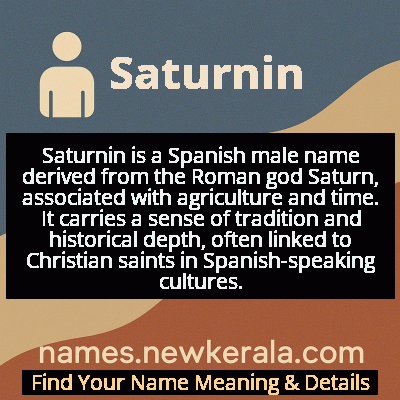Saturnin Name Meaning & Details
Origin, Popularity, Numerology Analysis & Name Meaning of Saturnin
Discover the origin, meaning, and cultural significance of the name SATURNIN. Delve into its historical roots and explore the lasting impact it has had on communities and traditions.
Name
Saturnin
Gender
Male
Origin
Spanish
Lucky Number
8
Meaning of the Name - Saturnin
Saturnin is a Spanish male name derived from the Roman god Saturn, associated with agriculture and time. It carries a sense of tradition and historical depth, often linked to Christian saints in Spanish-speaking cultures.
Saturnin - Complete Numerology Analysis
Your Numerology Number
Based on Pythagorean Numerology System
Ruling Planet
Saturn
Positive Nature
Ambitious, efficient, realistic, and authoritative.
Negative Traits
Materialistic, stressed, confrontational, and can be overly ambitious.
Lucky Colours
Dark blue, black.
Lucky Days
Saturday.
Lucky Stones
Blue sapphire, amethyst.
Harmony Numbers
2, 4, 6.
Best Suited Professions
Business leaders, managers, financial services, law enforcement.
What People Like About You
Leadership, determination, organizational skills.
Famous People Named Saturnin
Saint Saturnin of Toulouse
Christian Bishop and Martyr
First bishop of Toulouse, martyred for refusing to worship pagan gods
Saturnino de la Fuente García
Supercentenarian
Oldest living man in the world from 2021 until his death at age 112
Saturnino Herrán
Painter
Renowned Mexican muralist depicting indigenous culture and mestizo identity
Saturnino Martínez
Labor Leader
Founded important workers' publications and organized labor movements in Cuba
Name Variations & International Equivalents
Click on blue names to explore their detailed meanings. Gray names with will be available soon.
Cultural & Historical Significance
Extended Personality Analysis
The name Saturnin evokes a personality profile characterized by remarkable stability, patience, and depth. Those bearing this ancient name often exhibit the qualities of their namesake deity Saturn—methodical, responsible, and understanding of natural cycles and timing. They tend to be practical problem-solvers who approach challenges with systematic thinking rather than impulsive reactions. This grounded nature makes them exceptionally reliable in both personal and professional contexts, though they may sometimes be perceived as overly cautious or traditional. Their connection to Saturn's agricultural symbolism suggests individuals who understand the value of gradual growth and sustained effort, making them excellent long-term planners and builders. Simultaneously, the Christian martyr association adds layers of conviction and moral courage, indicating someone who stands firm in their principles even under pressure. Saturnins typically possess a quiet wisdom that comes from observing patterns and understanding that all things develop according to their proper season. While they may not be the most flamboyant or immediately charismatic individuals, their depth of character and unwavering reliability make them pillars in their communities and families, earning respect through consistent action rather than empty words.
Modern Usage & Popularity
In contemporary naming practices, Saturnin has become increasingly rare, representing what naming experts classify as a 'heritage name'—one preserved primarily for its historical and cultural significance rather than current popularity. While the Spanish variant Saturnino maintains modest usage in Spain and Latin America, particularly in rural regions and among families with strong Catholic traditions, both forms have been largely displaced by more modern names throughout the 20th century. Recent decades have seen a slight uptick in usage among parents seeking distinctive names with deep historical roots, often those interested in classical mythology, early Christian history, or unique names that stand out without being invented. The name appears most frequently in France's Occitanie region (around Toulouse) and in specific areas of Spain like Castile and the Basque Country. Digital globalization has introduced Saturnin to new audiences through historical content and genealogy platforms, creating occasional international usage beyond its traditional regions. Current naming trends favoring unique classical names suggest Saturnin may experience a modest revival, though it's unlikely to return to its former popularity given its strong historical and regional associations.
Symbolic & Spiritual Meanings
The symbolic meanings of Saturnin are richly layered, drawing from both pagan Roman and Christian traditions while incorporating astrological and agricultural symbolism. Primarily, the name symbolizes the 'gift of time'—not just chronological time, but the right timing, patience, and understanding of natural cycles. This connects to Saturn's dual role as god of agriculture and time, representing the wisdom that everything has its season and proper moment for harvest. The agricultural symbolism extends to themes of cultivation, both literal and metaphorical—the patient nurturing of crops, relationships, skills, or spiritual growth. In Christian interpretation, through Saint Saturnin, the name symbolizes steadfast faith and the courage to maintain one's convictions despite opposition, representing spiritual harvest through perseverance. Astrologically, Saturn represents structure, discipline, and karmic lessons, suggesting that bearers of this name may embody these qualities or navigate related life themes. The name also carries symbolic weight as a bridge between worlds—connecting earth and heaven through its agricultural and celestial associations, pagan and Christian through its historical evolution, and past and present through its ancient origins and contemporary usage. This makes Saturnin a name that symbolizes integration, patience, and the fruitful results of sustained effort over time.

